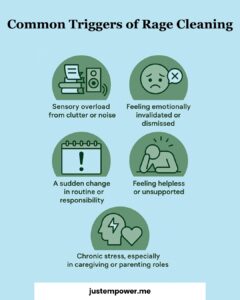Every spring, people feel the urge to declutter and refresh their spaces. But for some, that annual “spring clean” can turn into something more intense and emotionally charged.
You might have found yourself scrubbing baseboards or reorganizing your closet at 11 p.m. after a stressful day. If so, you may be experiencing what’s known as rage cleaning—an impulsive, emotionally-fueled burst of cleaning that feels more like survival than self-care.
But what does rage cleaning mean, and why does it happen?
What Does “Rage Cleaning” Mean?
Rage cleaning is the act of furiously cleaning your environment while feeling angry, overwhelmed, or overstimulated. It’s often triggered by emotional dysregulation—your nervous system is in “fight” mode, and your energy has to go somewhere. So you reach for the mop.
It can feel productive. Even satisfying. But beneath the surface, rage cleaning is often a trauma response or a sign of deeper mental health challenges like anxiety, ADHD, or OCD.
Why Do I Start Cleaning When I’m Angry?
When your body feels dysregulated, cleaning can offer a sense of control. It engages your senses, provides an outlet for pent-up energy, and gives you immediate results. However, the act of cleaning itself doesn’t actually process the emotion—it just masks it.
You might not even realize you’re rage cleaning until you’re exhausted, overstimulated, or snapping at loved ones for making another mess.
What Are Common Triggers for Rage Cleaning?
Some common triggers include:
- Sensory overload from clutter or noise
- Feeling emotionally invalidated or dismissed
- A sudden change in routine or responsibility
- Feeling helpless or u v vvnsupported
- Chronic stress, especially in caregiving or parenting roles
For parents—particularly mothers—rage cleaning may stem from being overstimulated and under-supported. When every corner of the home feels chaotic, every sound feels like too much, and your body is carrying the mental load of everyone else’s needs, cleaning can feel like the only available outlet. The act of scrubbing, sorting, or tossing clutter becomes a way to “clear the noise” and reclaim some sense of control.
In moments of heightened stress, your nervous system may be flooded with adrenaline, and movement—like cleaning—offers a temporary, cathartic release. It’s a way to physically process the overwhelm when there’s no time or space to sit with your emotions.
But while it may offer short-term relief, rage cleaning doesn’t address the root of the overstimulation—and can sometimes leave you feeling even more depleted afterward.

Is Rage Cleaning Healthy?
Occasionally turning to cleaning as a coping tool isn’t necessarily harmful. But rage cleaning and anxiety, rage cleaning and ADHD, and rage cleaning and OCD often go hand-in-hand.
When cleaning becomes compulsive, overwhelming, or emotionally exhausting, it can be a red flag.
Is Cleaning a Trauma Response?
Yes. For some, cleaning can be a trauma response—especially when used to self-soothe or regain control in the aftermath of emotional dysregulation. In childhood, if messes led to punishment or if cleanliness was equated with safety, those associations may resurface in adulthood.
For example, someone who grew up in a chaotic or unpredictable home environment may have internalized the idea that a tidy space is the only way to feel safe or in control.
Cleaning, then, becomes more than a routine task—it turns into a coping mechanism to manage anxiety, overwhelm, or feelings of powerlessness. It can offer a tangible sense of accomplishment or clarity when internal emotions feel chaotic or unresolved.
For trauma survivors, especially those with complex PTSD, OCD, or anxiety disorders, cleaning may temporarily soothe the nervous system by creating external order when internal regulation feels impossible.
However, this relief is often short-lived, and over-reliance on cleaning to cope can mask deeper emotional needs or unhealed wounds. Recognizing when cleaning shifts from being a helpful practice to a compulsive or avoidant behavior is an important step toward healing.
What Is an Example of OCD Cleaning?
OCD cleaning typically involves repetitive cleaning rituals that feel impossible to stop, even when they interfere with daily life. For example: scrubbing a surface multiple times until it feels “just right,” or avoiding touching objects for fear of contamination. If cleaning becomes intrusive, distressing, or time-consuming, it may be more than stress—it may be time to seek support.
Rage Cleaning and ADHD
People with ADHD may rage clean in response to executive functioning overload—when too many tasks or visual clutter cause mental shutdown. Cleaning becomes a way to reclaim order. But ADHD brains often hyperfocus, which can turn a small cleaning task into hours of overstimulation, frustration, or burnout.
Rage Cleaning and Anxiety
Anxiety thrives on “what ifs.” What if someone stops by and the house is a mess? What if I can’t focus because everything’s chaotic? Cleaning becomes a form of mental control—but without true emotional regulation, the anxiety returns.
Rage Cleaning and OCD
Like with anxiety or ADHD, rage cleaning can serve as a temporary release valve. But when paired with OCD, it may become more ritualistic or compulsive. You might feel like you have to clean a certain way, or until things feel “perfect.” That perfectionism can be both physically and emotionally draining.
A Healthier Alternative: Power Cleaning
Instead of rage cleaning, try power cleaning—a more intentional, regulated approach.
Inspired by occupational therapist Larissa Geleris, here are a few strategies to try:
- Focus on one task or one surface. Clear just the counter or fold one load of laundry. Small wins calm your nervous system.
- Use batching. Gather all the trash first, then do dishes—don’t bounce between tasks.
- Set a timer. Clean for 10–15 minutes, then stop. This helps prevent overexertion.
- Be mindful. Stay present in your body. Play music, notice your breath, and slow down.
Cleaning can still be powerful—but it doesn’t have to be fueled by rage.
When to Seek Support
If you notice that your cleaning habits feel compulsive, emotionally reactive, or leave you feeling more drained than helped, it may be time to talk to a therapist.
You don’t have to live in a cycle of stress and burnout. Therapy can help you understand your emotional triggers and build healthier, more sustainable coping strategies.
Final Thoughts
Spring cleaning is meant to bring clarity, not chaos. If you’re feeling overwhelmed, ask yourself: Am I cleaning because it helps me feel better—or because I’m trying to outrun my emotions?
The next time you feel a rage clean coming on, pause. Breathe. Choose a smaller goal. Your nervous system will thank you.
